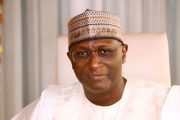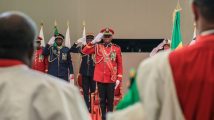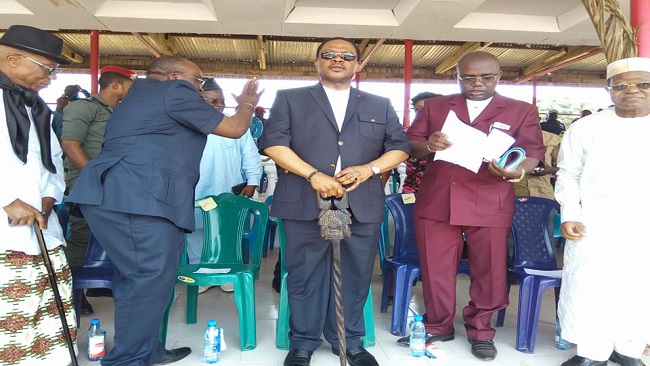Categories
Recent Posts
- CPDM Crime Syndicate: Biya appoints Johnny Razack as Chair of SNI
- Mali coup leader wins backing to be president for next five years
- African Union lifts sanctions against Gabon after political transition review
- Africa has no resource curse!
- Football: Dembele goal gives PSG narrow advantage over Arsenal in Champions League
Archives
- April 2025
- March 2025
- February 2025
- January 2025
- December 2024
- November 2024
- October 2024
- September 2024
- August 2024
- July 2024
- June 2024
- May 2024
- April 2024
- March 2024
- February 2024
- January 2024
- December 2023
- November 2023
- October 2023
- September 2023
- August 2023
- July 2023
- June 2023
- May 2023
- April 2023
- March 2023
- February 2023
- January 2023
- December 2022
- November 2022
- October 2022
- September 2022
- August 2022
- July 2022
- June 2022
- May 2022
- April 2022
- March 2022
- February 2022
- January 2022
- December 2021
- November 2021
- October 2021
- September 2021
- August 2021
- July 2021
- June 2021
- May 2021
- April 2021
- March 2021
- February 2021
- January 2021
- December 2020
- November 2020
- October 2020
- September 2020
- August 2020
- July 2020
- June 2020
- May 2020
- April 2020
- March 2020
- February 2020
- January 2020
- December 2019
- November 2019
- October 2019
- September 2019
- August 2019
- July 2019
- June 2019
- May 2019
- April 2019
- March 2019
- February 2019
- January 2019
- December 2018
- November 2018
- October 2018
- September 2018
- August 2018
- July 2018
- June 2018
- May 2018
- April 2018
- March 2018
- February 2018
- January 2018
- December 2017
- November 2017
- October 2017
- September 2017
- August 2017
- July 2017
- June 2017
- May 2017
- April 2017
- March 2017
- February 2017
- January 2017
- December 2016
- November 2016
- October 2016
- September 2016
- August 2016
- July 2016
- June 2016
Featured
Most Commented Posts
 4 Anglophone detainees killed in Yaounde
4 Anglophone detainees killed in Yaounde
18 comments Chantal Biya says she will return to Cameroon if General Ivo Yenwo, Martin Belinga Eboutou and Ferdinand Ngoh Ngoh are sacked
Chantal Biya says she will return to Cameroon if General Ivo Yenwo, Martin Belinga Eboutou and Ferdinand Ngoh Ngoh are sacked
13 comments The Anglophone Problem – When Facts don’t Lie
The Anglophone Problem – When Facts don’t Lie
12 comments Anglophone Nationalism: Barrister Eyambe says “hidden plans are at work”
Anglophone Nationalism: Barrister Eyambe says “hidden plans are at work”
12 comments Largest wave of arrest by BIR in Bamenda
Largest wave of arrest by BIR in Bamenda
10 comments
Latest Tweets
Featured
-

CPDM Crime Syndicate: Biya appoints Johnny Razack as Chair of SNI
-

Mali coup leader wins backing to be president for next five years
-

African Union lifts sanctions against Gabon after political transition review
-

Africa has no resource curse!
-

Football: Dembele goal gives PSG narrow advantage over Arsenal in Champions League
-

US: Trump addressing rally in Michigan as he marks 100 days in office
-

Vatican: Conclave to elect new pope will start on May 7
© Cameroon Concord News 2025





8, March 2017
Philemon Yang Bamenda Mission stresses nothing as regards to the connectedness, contestedness and complexity of happenings in Southern Cameroons 0
Southern Cameroon’s pain commands international headlines, demands quick action and sets the scene for a geopolitical drama on Cameroon’s future power in the CEMAC-Sub Saharan region. The poor handling of the Anglophone crisis by the Biya Beti Ewondo regime is pushing the intractable conflict to get worse before it gets better. What can be done about it needs much more informed and constructive African Union debate, especially in Abuja which will bear many of the actual and potential consequences if Anglophones should secede from La Republique du Cameroun.
Since 2016, there has been a systematically Bokoharamization by troops loyal to the regime in Yaoundé of West Cameroon. For several months, Anglophone Cameroon has witnessed rapes, extra judicial killings and hundreds of abductions. The North West and South West CPDM political elites blame each other, with none citing the numerous atrocities committed against their own people by Francophone soldiers deployed to the region. The Cameroon Anglophone Civil Society Consortium and its leadership have been targeted. Internet connection in Southern Cameroons has been shut down. Unconfirmed reports say hundreds of innocent Southern Cameroonians youths have been killed and buried in mass graves in the Soa locality near Yaoundé. Prominent Anglophone judges and lawyers have been arrested. These are war crimes, documented on the ground and in appalling TV and social media footage.
The only prominent Anglophone citizen in the Biya regime, Prime Minister Yang Philemon has failed to take genuine actions to tackle the escalation, arising from La Republique du Cameroun’s ruthless military campaign to bully Southern Cameroonians to submission. The 84 year old President Biya’s failure to engage the Cameroon Anglophone Civil Society Consortium on the Anglophone crisis adds to uncertainty over the fragmented peace that reigns in the country.
Taking advantage
The political rhetoric coming out of Yaoundé has been very telling. Francophone media gurus have described the Anglophone people as “rats”. President Biya in his nationwide address said Anglophones were extremists and terrorists. Higher Education Minister, Fame Ndongo observed that Southern Cameroonians were like a fly in an ointment. The Biya regime is taking advantage of the division that exists among the Southern Cameroon groups both at home and in the Diaspora to assert its military and political roles in the territory while Abuja is cautious on supporting the Consortium for fear of an escalation into war with Biafra.
Whoever wins in this current Anglophone crisis will have to deal with an armed conflict in the nearest future. In the meantime, Prime Minister Philemon Yang is struggling alone to develop a coherent approach to the diplomacy on the Southern Cameroons crisis amid demands by Southern Cameroonians that the Biya Francophone government should do more by releasing all Anglophone detainees including the leaders of the Consortium, reinstate internet services in Southern Cameroons and engaged in meaning dialogue with the Cameroon Anglophone Civil Society Consortium.
Philemon Yang’s recent decision to tour the Bamenda province of Southern Cameroons could be seen as another form of provocation coming from the Yaoundé regime. The Prime Minister is in the North West with nothing to offer. To be sure, his trip stresses nothing as regards to the connectedness, contestedness and complexity of happenings in Southern Cameroons. Biya should be at the center of the diplomacy on Southern Cameroons not Philemon Yang. Philemon Yang does not have the political acumen and authority to open small spaces that can lead to sane political solutions on the Anglophone problem. The Prime Minister’s Bamenda trip is not a worthy endeavour.
By Soter Tarh Agbaw-Ebai